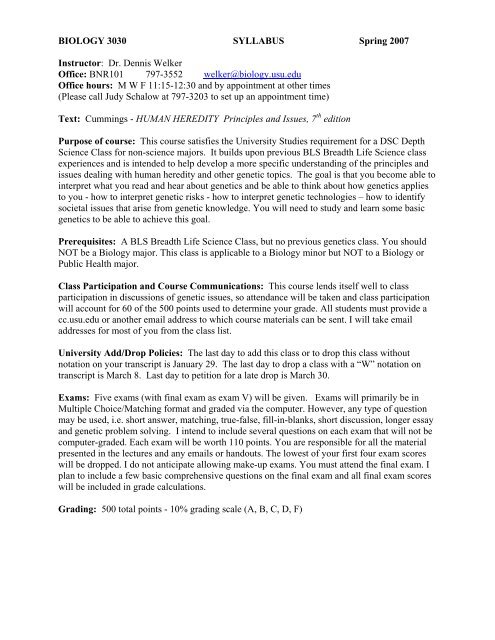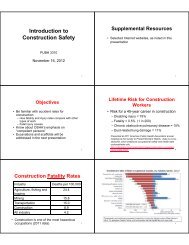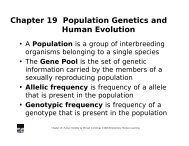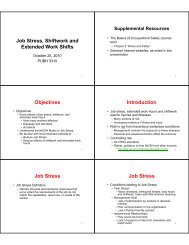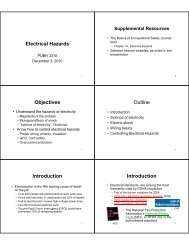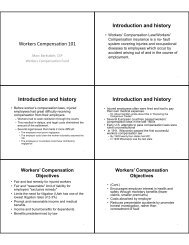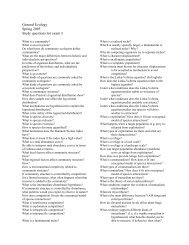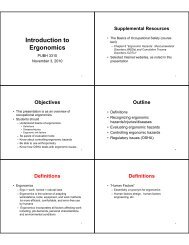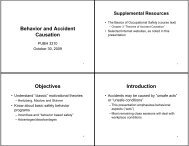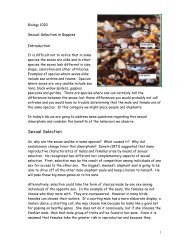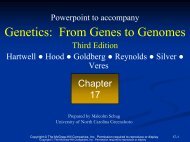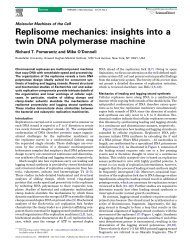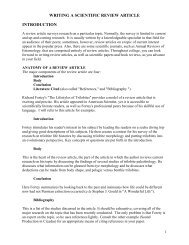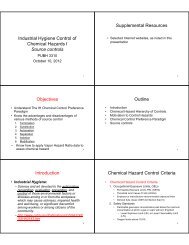BIOLOGY 3030 SYLLABUS Spring 2007 Instructor: Dr. Dennis ...
BIOLOGY 3030 SYLLABUS Spring 2007 Instructor: Dr. Dennis ...
BIOLOGY 3030 SYLLABUS Spring 2007 Instructor: Dr. Dennis ...
You also want an ePaper? Increase the reach of your titles
YUMPU automatically turns print PDFs into web optimized ePapers that Google loves.
<strong>BIOLOGY</strong> <strong>3030</strong> <strong>SYLLABUS</strong> <strong>Spring</strong> <strong>2007</strong><strong>Instructor</strong>: <strong>Dr</strong>. <strong>Dennis</strong> WelkerOffice: BNR101 797-3552 welker@biology.usu.eduOffice hours: M W F 11:15-12:30 and by appointment at other times(Please call Judy Schalow at 797-3203 to set up an appointment time)Text: Cummings - HUMAN HEREDITY Principles and Issues, 7 th editionPurpose of course: This course satisfies the University Studies requirement for a DSC DepthScience Class for non-science majors. It builds upon previous BLS Breadth Life Science classexperiences and is intended to help develop a more specific understanding of the principles andissues dealing with human heredity and other genetic topics. The goal is that you become able tointerpret what you read and hear about genetics and be able to think about how genetics appliesto you - how to interpret genetic risks - how to interpret genetic technologies – how to identifysocietal issues that arise from genetic knowledge. You will need to study and learn some basicgenetics to be able to achieve this goal.Prerequisites: A BLS Breadth Life Science Class, but no previous genetics class. You shouldNOT be a Biology major. This class is applicable to a Biology minor but NOT to a Biology orPublic Health major.Class Participation and Course Communications: This course lends itself well to classparticipation in discussions of genetic issues, so attendance will be taken and class participationwill account for 60 of the 500 points used to determine your grade. All students must provide acc.usu.edu or another email address to which course materials can be sent. I will take emailaddresses for most of you from the class list.University Add/<strong>Dr</strong>op Policies: The last day to add this class or to drop this class withoutnotation on your transcript is January 29. The last day to drop a class with a “W” notation ontranscript is March 8. Last day to petition for a late drop is March 30.Exams: Five exams (with final exam as exam V) will be given. Exams will primarily be inMultiple Choice/Matching format and graded via the computer. However, any type of questionmay be used, i.e. short answer, matching, true-false, fill-in-blanks, short discussion, longer essayand genetic problem solving. I intend to include several questions on each exam that will not becomputer-graded. Each exam will be worth 110 points. You are responsible for all the materialpresented in the lectures and any emails or handouts. The lowest of your first four exam scoreswill be dropped. I do not anticipate allowing make-up exams. You must attend the final exam. Iplan to include a few basic comprehensive questions on the final exam and all final exam scoreswill be included in grade calculations.Grading: 500 total points - 10% grading scale (A, B, C, D, F)
Proposed Class Schedule:January 8 A prospective on Human genetics (Chapter 1)10 Chapter 1 continued12 Cell Cycle, Mitosis and Meiosis (Chapter 2)17 Chapter 2 continued19 Mendelian Genetics (Chapter 3)22 Chapter 3 continued24 Pedigrees and Genetic Mechanisms (Chapter 4)26 Chapter 4 continued29 EXAM I Chapters 1 – 431 Polygenic Inheritance (Chapter 5)February 2 Chapter 5 continued5 Chromosome Mutations (Chapter 6)7 Chapter 6 continued9 Sex Determination (Chapter 7)12 Chapter 7 continued14 DNA and chromosome structure (Chapter 8)16 Chapter 8 continued20 Review or catch-up21 EXAM II Chapters 5 - 823 Gene Expression (Chapter 9)26 Chapter 9 continued28 Metabolic Gene Diseases (Chapter 10)March 2 Chapter 10 continued5 Gene Mutations (Chapter 11)7 Chapter 11 continued9 Recombinant DNA (Chapter 12)19 Chapter 12 continued21 EXAM III Chapters 9 - 1223 Biotechnology and Genomics (Chapter 13)26 Chapter 13 continued28 Biotechnology and Society (Chapter 14)30 Chapter 14 continuedApril 2 The Human Genome Project (Chapter 15)4 Chapter 15 continued6 Gene Therapy (Chapter 16)9 Chapter 16 continued11 EXAM IV Chapters 13 - 1613 Genes and the Immune System (Chapter 17)16 Chapter 17 continued18 Genetics and Behavior (Chapter 18)20 Chapter 18 continued23 Population Genetics (Chapter 19)25 Chapter 19 continued27 ReviewMay 2 FINAL EXAM – 1:30 PM
The following policies as described in the USU Policy Manual will apply to this class:Academic Freedom and Professional Responsibilities (Faculty Code)Academic freedom is the right to teach, study, discuss, investigate, discover, create, and publishfreely. Academic freedom protects the rights of faculty members in teaching and of students inlearning. Freedom in research is fundamental to the advancement of truth. Faculty members areentitled to full freedom in teaching, research, and creative activities, subject to the limitationsimposed by professional responsibility.Academic Integrity - "The Honor System"Each student has the right and duty to pursue his or her academic experience free of dishonesty.The Honor System is designed to establish the higher level of conduct expected and required ofall Utah State University students.The Honor Pledge: To enhance the learning environment at Utah State University and todevelop student academic integrity, each student agrees to the following Honor Pledge: "Ipledge, on my honor, to conduct myself with the foremost level of academic integrity." Astudent who lives by the Honor Pledge is a student who does more than not cheat, falsify, orplagiarize. A student who lives by the Honor Pledge:• Espouses academic integrity as an underlying and essential principle of the Utah StateUniversity community;• Understands that each act of academic dishonesty devalues every degree that is awardedby this institution; and is a welcomed and valued member of Utah State University.Grievance Process (Student Code)Students who feel they have been unfairly treated [in matters other than (i) discipline or (ii)admission, residency, employment, traffic, and parking - which are addressed by proceduresseparate and independent from the Student Code] may file a grievance through the channels andprocedures described in the Student Code:http://studentlife.tsc.usu.edu/stuserv/pdf/student_code.pdf (Article VII. Grievances).PlagiarismPlagiarism includes knowingly "representing, by paraphrase or direct quotation, the published orunpublished work of another person as one's own in any academic exercise or activity withoutfull and clear acknowledgment. It also includes the unacknowledged used of materials preparedby another person or agency engaged in the selling of term papers or other academic materials."The penalties for plagiarism are severe. They include warning or reprimand, grade adjustment,probation, suspension, expulsion, withholding of transcripts, denial or revocation of degrees, andreferral to psychological counseling.Sexual HarassmentSexual harassment is defined by the Affirmative Action/Equal Employment OpportunityCommission as any "unwelcome sexual advances, requests for sexual favors, and other verbal orphysical conduct of a sexual nature." If you feel you are a victim of sexual harassment, you may
talk to or file a complaint with the Affirmative Action/Equal Employment Opportunity Officelocated in Old Main, Room 161, or call the AA/EEO Office at 797-1266.Students with DisabilitiesStudents with physical, sensory, emotional or medical impairments may be eligible forreasonable accommodations in accordance with the Americans with Disabilities Act and Section504 of the Rehabilitation Act of 1973. All accommodations are coordinated through theDisability Resource Center (DRC) in Room 101 of the University Inn, 797-2444 voice, 797-0740TTY, or toll free at 1-800-259-2966. Please contact the DRC as early in the semester as possible.Alternate format materials (Braille, large print or digital) are available with advance notice.Withdrawal Policy and "I" Incomplete Grade PolicyStudents are required to complete all courses for which they are registered by the end of thesemester. In some cases, a student may be unable to complete all of the coursework because ofextenuating circumstances, but not due to poor performance or to retain financial aid. The term'extenuating' circumstances includes: (1) incapacitating illness which prevents a student fromattending classes for a minimum period of two weeks, (2) a death in the immediate family, (3)financial responsibilities requiring a student to alter a work schedule to secure employment, (4)change in work schedule as required by an employer, or (5) other emergencies deemedappropriate by the instructor.


